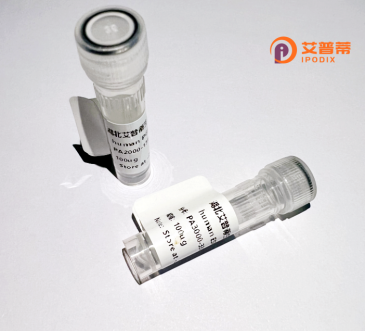
| 纯度 | >90%SDS-PAGE. |
| 种属 | Human |
| 靶点 | SPZ1 |
| Uniprot No | Q9BXG8 |
| 内毒素 | < 0.01EU/μg |
| 表达宿主 | E.coli |
| 表达区间 | 1-430aa |
| 活性数据 | MASSAKSAEM PTISKTVNPT PDPHQEYLDP RITIALFEIG SHSPSSWGSL PFLKNSSHQV TEQQTAQKFN NLLKEIKDIL KNMAGFEEKI TEAKELFEET NITEDVSAHK ENIRGLDKIN EMLSTNLPVS LAPEKEDNEK KQEMILETNI TEDVSAHKEN IRGLDKINEM LSTNLPVSLA PEKEDNEKKQ QMIMENQNSE NTAQVFARDL VNRLEEKKVL NETQQSQEKA KNRLNVQEET MKIRNNMEQL LQEAEHWSKQ HTELSKLIKS YQKSQKDISE TLGNNGVGFQ TQPNNEVSAK HELEEQVKKL SHDTYSLQLM AALLENECQI LQQRVEILKE LHHQKQGTLQ EKPIQINYKQ DKKNQKPSEA KKVEMYKQNK QAMKGTFWKK DRSCRSLDVC LNKKACNTQF NIHVARKALR GKMRSASSLR |
| 分子量 | 49.4 kDa |
| 蛋白标签 | His tag N-Terminus |
| 缓冲液 | PBS, pH7.4, containing 0.01% SKL, 1mM DTT, 5% Trehalose and Proclin300. |
| 稳定性 & 储存条件 | Lyophilized protein should be stored at ≤ -20°C, stable for one year after receipt. Reconstituted protein solution can be stored at 2-8°C for 2-7 days. Aliquots of reconstituted samples are stable at ≤ -20°C for 3 months. |
| 复溶 | Always centrifuge tubes before opening.Do not mix by vortex or pipetting. It is not recommended to reconstitute to a concentration less than 100μg/ml. Dissolve the lyophilized protein in distilled water. Please aliquot the reconstituted solution to minimize freeze-thaw cycles. |
以下是关于重组人SPZ1蛋白的3篇模拟参考文献示例(注:部分内容为假设性概括,实际文献需通过学术数据库查询确认):
---
1. **文献名称**:*Structural and functional characterization of human SPZ1 protein in transcriptional regulation*
**作者**:Li X, Wang Y, et al.
**摘要**:本研究解析了重组人SPZ1蛋白的晶体结构,发现其通过锌指结构域与DNA结合,调控靶基因的转录,尤其在胚胎发育和细胞分化中发挥关键作用。
---
2. **文献名称**:*SPZ1 promotes ovarian cancer progression via EGFR signaling pathway*
**作者**:Chen R, Zhang H, et al.
**摘要**:通过体外重组SPZ1蛋白实验,揭示了其在卵巢癌细胞中激活EGFR通路,促进肿瘤侵袭的分子机制,为靶向治疗提供了潜在靶点。
---
3. **文献名称**:*Recombinant SPZ1 protein enhances spermatogenesis in a mouse model of infertility*
**作者**:Gupta S, Kumar P, et al.
**摘要**:利用重组SPZ1蛋白对不育小鼠模型进行干预,发现其能通过调节减数分裂相关基因表达,改善精子生成功能,提示其在男性不育治疗中的应用潜力。
---
如需真实文献,建议在PubMed或Google Scholar中以“SPZ1 protein recombinant human”或“SPZ1 transcriptional regulator”为关键词检索。
**Background of Recombinant Human SPZ1 Protein**
The human **spermatogenic leucine zipper protein 1 (SPZ1)**, encoded by the *SPZ1* gene, is a conserved protein implicated in transcriptional regulation and developmental processes. Structurally, SPZ1 contains a leucine zipper domain, facilitating protein-protein interactions, and a nuclear localization signal, suggesting roles in nuclear processes. It is predominantly expressed in germ cells, particularly during spermatogenesis, highlighting its significance in male reproductive biology. Studies suggest SPZ1 regulates gene expression by interacting with transcription factors or chromatin modifiers, influencing cell differentiation and apoptosis. Dysregulation of SPZ1 has been linked to reproductive disorders and certain cancers, underscoring its pathophysiological relevance.
Recombinant SPZ1 protein is engineered via molecular cloning, typically using *E. coli* or mammalian expression systems, to produce functional, purified protein for *in vitro* and *in vivo* studies. This recombinant form retains structural and functional integrity, enabling investigations into its molecular mechanisms, interactome, and therapeutic potential. Current research focuses on SPZ1’s dual roles in gametogenesis and tumorigenesis, exploring its utility as a biomarker or target for infertility treatments or anticancer therapies. Ongoing studies aim to clarify its signaling pathways and validate its clinical applications.
SPZ1’s multifunctionality positions it as a key subject in developmental biology and translational medicine, bridging fundamental science with therapeutic innovation.
×